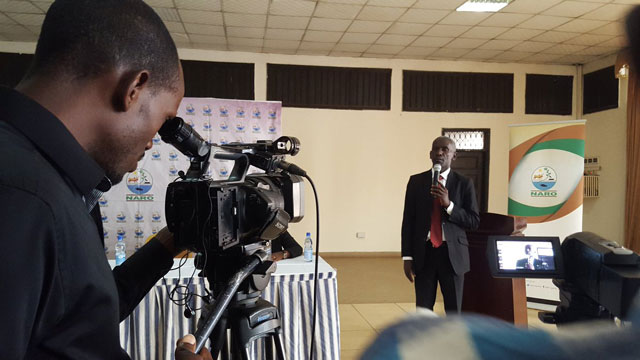
Kampala, Uganda | ANDREW S. KAGGWA | Days after parliament quietly passed the National Biotechnology and Biosafety Bill, widely known as the ‘GMO Bill’, in early October, Meg Hilbert Jaquay, the Managing Director of Jakana Foods Limited, remains sad. Her company exports 30 metric tonnes of organic dried fruits to U.S., Europe, Asia, and across Africa every year.
But, she says, all this is now under threat as Uganda will become less competitive for the fastest growing food market segment in U.S. and Europe.
“GMO products are not allowed under either the Organic Standard or Fair Trade standards,” Meg told The Independent, “The rest of the world is moving away from this old technology, and instead of Uganda looking to the future it is still in catch-up mode.”
Meg says because of government’s failure to recognise the organic sector, Uganda which was second in the world has now dropped to fourth, and it may drop further unless the government agrees to pass the Organic Policy to protect the sector.
Andrew Ndawula Kalema who is a certified organic farmer in Nakaseke District says the passing of the Bill is a blow to organic farmers.
“Uganda is one of the countries which have been having a comparative advantage of exporting organic products but with passing of the Bill we have now lost this advantage,” Kalema says.
He says the passing of the Bill was possible not because of its merits and how much it’s going to benefit the country but because of the huge financial muscle of the multinational GMO seed companies behind it and who will be the main beneficiaries not Ugandans.
Patrick Luganda, the Executive Director of Media link, an organisation which links farmers with the media and trains climate journalists said the way the Bill was passed is suspect.
“That was like smuggling the Bill. Why pass it at such a time when members are charged over the age limit debate. And what a coincidence that similar laws are being pushed in Malawi, Kenya, and Ghana,” Luganda said.
Luganda further explained that in Malawi the government has even made it illegal to plant indigenous varieties and farmers have to plant only the GMO seeds which are expensive.
Luganda was describing how the Bill was passed on Oct. 04, at a time when the Speaker of Parliament when all attention was on the so-called `age-limit Bill’. One side of parliament, which is supposed to be occupied by the opposition, was empty as many of them had been expelled and the others were boycotting sittings in solidarity. Thomas Tayebwa (Ruhindi North) wanted the Bill’s passing delayed until the opposition members returned but he was overruled.
President Yoweri Museveni’s earlier utterances backing the Bill appear to have swayed the decision.
Scientists excited, CSOs to sue
Museveni said the GMO law is to “help the country resolve some of the problems the agriculture sector is facing”. He is now expected to sign it into law as soon as it gets to his table.
The passing of the Bill sent the pro-GMO scientists into celebration.
The list of the 135 “stakeholders” whom the Parliamentary Committee on Science and Technology, chaired by Nakifuma County MP, Eng. Robert Kafeero Ssekitoleko, interacted with to craft the law reads like the Who-is-Who list of Uganda’s scientists; from government departments like NARO, UNSCT, Uganda Virus Research Institute, National Drug Authority, Uganda National Bureau of Standards, universities and others.
But, although three farmers are on the list, the Uganda National Farmers Federation (UNFF), a body which claims to be an umbrella body of all farmers’ associations in the country, is conspicuously missing. Its Executive Secretary, Augustine Mwendya, had earlier told The Independent that he backs the Bill.
Dr. Godfrey Asea, the director of National Crops Resources Research Institute (NACRRI), one of the research institutes under NARO in Namulonge in Wakiso district congratulated Parliament for passing the Bill.
“We now have a framework to conduct environment release and research outside the institutes,” he said.
Erastus Nsubuga, the chairperson of the Uganda Biotechnology and Biosafety Consortium, called the law “a great achievement” that will help scientists work within the country.
 The Independent Uganda: You get the Truth we Pay the Price
The Independent Uganda: You get the Truth we Pay the Price





Dear Mr. Andrew Mujuni Mwenda, the CEO of The Independent Magazine Publications: your recent article “Tears and cheers over new GMO law” raises a lot of questions as far as I’m concerned. After reading it over and over again, I came to a conclusion that it was designed to paint a blemish on Uganda’s science of modern Modern Agricultural Biotechnology (MAB) with which specialists in NARO genetically-engineer/modify plants/crops for resistance against a lot of pests, diseases and challenges like drought.. Myself as a scientist and a keen reader of The Independent Magazine, I’d like to inform you that I equally follow keenly what NARO is doing to apply the science of MAB. But what disturbs me is that it looks like it is The Independent Magazine’s official policy to oppose and decampaign MAB/GM-technology. This is so, because just a few months after you published: “EXPOSED: Uganda’s secret GMO research” with the aim of dissuading Parliament not to approve the National Biotechnology and Biosafety Bill (2012) into law—to the contrary, MPs passed the Bill on October 4th, 2017. Now, here comes another skewed one intended to mislead the public and the world at large, that the new National Biosafety Law was illegally passed. That it was “smuggled”, because a few days earlier there had been chaos, when MPs fought amongst themselves and were violently forced out of their chambers allegedly by SFC operatives. Now, Mr. Mwenda, did Parliament close down business because 25 MPs had been thrown out by the Speaker for misbehaving? Or did it close down because MPs were forcefully ejected out? Did the Independent’s interviewees want the whole country to close down because MPs had fought among themselves and were forcefully ejected? Did the Independent Magazine which carries these allegations, close down? Did public and private businesses like transport, education, hotels, other services and NGOs sympathetic to the MPs who were ejected, close down because fighting had taken place in Parliament? If these didn’t close down, why should any good thinking person expect Parliament to stop to a halt, because 25 and other of its members [the Opposition] were out? Does the 25 plus the Opposition amount to the majority required for Parliament to operate? Why did the Independent carry such lousy allegations? Is it desperate for any remarks as long as they’re strongly opposed to the new Biosafety law or to GMOs? I found it extremely laughable for your reporter [ANDREW S. KAGGWA] who carefully chooses well-known anti-biotech activists, to include allegations by the Jakana Fruit dealer to claim their exports to Europe have dwindled because Uganda had approved the Biosafety law!! Does passing of this law usher in GM-fruits? Uganda has not developed any GM fruits, save for the bananas resistant to the ferocious banana bacterial wilt (BBW) and those with improved levels of Vitamin A micronutrients. But these are not yet ready for release. This allegation by Jakana begs the question: Has Europe explained the reason why they have rejected Jakana’s fruits? (If the allegation is true at all!!) Does Europe itself pour into the sea, the millions of tons of GM-corn, soya and cotton it imports from North America (USA, Canada and Mexico), from Latin America (Brazil, Argentina) and more from India, China e.t.c? Or do they consume and feed their livestock and poultry? If they utilize them, including production of millions of metric tons of GMO-drugs and other medical products, why should Ugandan GM-products be “rejected”? These allegations are outbursts planned to come out, in the aftermath of the passage of the National Biosafety Bill into law. It is something they’ve worked hard and long to fail. Now that it went the ‘wrong’ way, that’s the reason for this sour-grapping! Let me make particular reference to the science of modern agricultural biotechnology, which is why the National Biotechnology and Biosafety Bill (2012) was formulated. It mainly aims to regulate and oversee modern agricultural biotechnology in research, development, release and utilization (farming, handling, processing trading, and consumption e.t.c). Some many years ago, Mr. Godber Tumushabe, the CEO Great Lakes Institute for Strategic Studies (GLISS) was contracted by the Government of Uganda – while he headed ACODE – as a consultant to study and provide the basis for formulating a national biotechnology and biosafety framework for Uganda. Godber studied the then regulatory environment and found it lacking the adequate policies, laws, institutions and regulations to oversee and manage the science of modern biotechnology. He among others recommended the need for the formulation of a policy and consequently enact a law and relevant regulations. Today, ACODE is one of the leading anti-biotechnology and GM-technology NGOs, that connives with The Independent Magazine’s Anti-GMO Reporter to model stories the way they are published – skewed/inclined against this science. It’s either a deeply-seated fear, a cultic hatred or all these and ideological disorientation of the activists and Kaggwa plus his news sources that are using the Independent Magazine, most likely in full knowledge of the Editor, to consistently run such negative stories against biotechnology. Ofcourse, I don’t rule out covert participation of other NGOs and related activists within their networks, who influence the planting of such stories in the Magazine. Then there’s the private sector or business interests, that see loss of market for some of their products such as chemicals, that are used for spraying against pests, which biotechnology replaces in many aspects. When scientists employ biotechnology to genetically-engineer crops, to resist pests and diseases, in some cases spraying of chemicals against such pests and diseases, would not be necessary anymore. As a result, chemical manufacturers, distributors, wholesalers and retailers lose market for their chemical products. Such interested parties would also covertly buy NGO activists and journalists, to fight against GM-crop-technology, especially via sponsorship of journalists and media messages that cause public fear, apprehension and rejection. And that is indeed the intention of such articles by ANDREW KAGGWA—who himself has expressed his anti-Biotech/GM-technology side in his Facebook Page expressions/arguments. Please Mr. Mwenda don’t allow the esteemed publication to be used to fight advancement in agricultural research and development–atleast I know you as a progressive man who believes in, and supports civilization in all sectors, including agriculture. These groups possess conservative and retrogressive ideas, that want our farmers to remain poor smallholder peasants so that as activists they have reason to fundraise in Europe to “fight and reduce poverty, hunger, disease and malnutrition.”